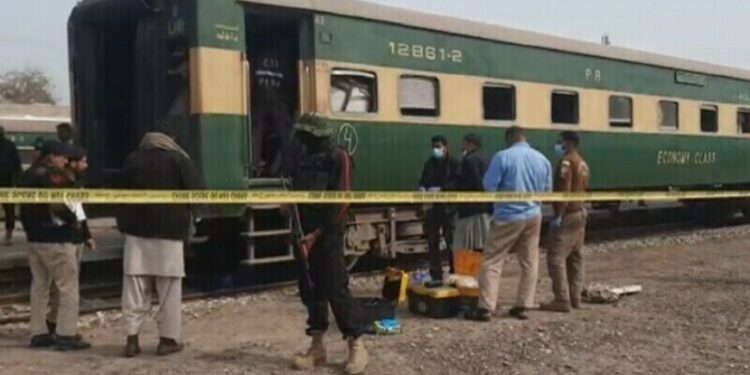Militants attacked Jaffar Express in Balochistan, taking hostages. Security forces launched a rescue operation amid rising regional tensions.
Terrorist Attack on Jaffar Express:
On March 11, 2025, Pakistan witnessed a tragic and alarming terrorist attack when militants ambushed the Jaffar Express in Balochistan’s Bolan district. Armed militants affiliated with the Baloch Liberation Army (BLA) derailed and took control of the passenger train, which was transporting about 500 passengers from Quetta to Peshawar. The terrorists used women and children as human shields and captured more than 100 captives, including security personnel.
This horrifying event has brought attention to the ongoing insurgency in Balochistan, a province that has long been plagued by security issues and separatist activities. Serious questions are raised by the incident regarding railway infrastructure safety, national security, and the growing audacity of terrorist organizations active in the area.
How the Attack Unfolded:
The Jaffar Express was passing through the mountainous Bolan region when the militants carried out a well-planned assault. The attackers first blew up a section of the railway track, forcing the train to halt inside a tunnel. As the train came to a stop, the militants opened fire on the security personnel aboard, injuring several.
The situation escalated quickly as the armed group overpowered the remaining security officials and took control of the train. Reports confirmed that the militants had taken hostages, including families travelling on the train. The BLA later issued a statement claiming responsibility for the attack, stating that they had specifically targeted security forces present on the train.
BLA and Its History of Insurgency:
The Baloch Liberation Army (BLA) is a separatist militant group that has been fighting for the independence of Balochistan for decades. The group claims that the Pakistani government has neglected the region, depriving its people of their natural resources and economic development. The BLA has been responsible for multiple attacks in recent years, primarily targeting military installations, infrastructure projects, and Chinese investments in the region.
Because of its deadly actions, the BLA has been formally classified as a terrorist organization by the US and the Pakistani government. Since it put hundreds of innocent civilians, including women and children, in direct danger, the most recent attack on the Jaffar Express represents a grave escalation.
Challenges in the Rescue Operation:
Following the attack, the Pakistani military immediately launched a rescue operation. However, the operation faced several challenges:
- Difficult Terrain: The mountainous Bolan region made it difficult for security forces to reach the site quickly. The narrow roads and rugged landscape delayed reinforcements.
- Hostage Situation: The militants used hostages as human shields, making it difficult for security forces to carry out an aggressive counterattack without endangering lives.
- Threats of Execution: The BLA warned that they would start executing hostages if military action continued. This forced authorities to proceed with extreme caution.
- Foreign Links: Intelligence reports suggested that the militants were in contact with foreign handlers, potentially receiving real-time instructions during the attack.
Despite these challenges, security forces surrounded the area and began a step-by-step clearance operation to rescue the hostages and eliminate the attackers.
Government and International Response:
The attack drew widespread condemnation from both national and international communities.
Pakistan’s Response:
- Interior Minister Mohsin Naqvi strongly condemned the attack, vowing that those responsible would be eliminated.
- Emergency measures were imposed in hospitals in Sibi and Quetta to prepare for possible casualties.
- Railway security nationwide was put on high alert to prevent further incidents.
International Reaction:
- United Nations: Expressed concern over the increasing violence in Balochistan and urged all parties to seek peaceful resolutions.
- China: As an economic partner in Pakistan, China urged stronger security for infrastructure projects, fearing similar attacks on its workers.
- United States: Condemned the attack and reiterated its position that the BLA is a terrorist organization.
The attack has once again placed Pakistan’s counterterrorism efforts under scrutiny, with calls for stronger intelligence gathering and security measures.
Balochistan’s Longstanding Conflict:
For many years, Balochistan has been a hotbed of insurgency. Natural resource-rich, the province has long been a source of conflict between the Pakistani government and separatist organizations.
Issues Behind the Conflict:
- Resource Exploitation: Baloch nationalists claim that the province’s gas, minerals, and other resources are extracted for national use, with little benefit to local communities.
- Political Marginalization: Separatists argue that the region lacks political representation and is governed by central authorities with little local input.
- Military Operations: Pakistan’s military has launched multiple operations to counter Baloch insurgents, but the conflict remains unresolved.
The BLA and other groups have used these grievances to justify their attacks on government forces and infrastructure. However, targeting civilians, as seen in the Jaffar Express incident, only strengthens the argument against their cause.
Role of Social Media and Propaganda:
On social media, false information quickly proliferated after the incident. According to reports, anti-Pakistan groups and Indian media outlets were exaggerating the attack, disseminating unconfirmed information, and inciting panic using AI-generated content.
In a statement, the Pakistani military advised the public to avoid propaganda and only trust official sources for information. The event brought to light the significance of digital warfare in contemporary conflicts, where commanding the narrative is just as crucial as winning the combat.
Future of Security in Balochistan:
The Jaffar Express attack has raised serious questions about security in Pakistan, particularly in its restive provinces. Moving forward, experts suggest several steps to prevent similar incidents:
- Enhanced Railway Security: More armed guards should be deployed on vulnerable railway routes.
- Intelligence Strengthening: Better monitoring of separatist groups to prevent attacks before they occur.
- Negotiation Efforts: While military action is necessary, political dialogue should also be explored to address the root causes of the insurgency.
- Economic Development: Investing in Balochistan’s infrastructure and local businesses to create employment opportunities and reduce support for militant groups.
Conclusion:
The Jaffar Express incident served as a harsh reminder of Pakistan’s continuous security issues. The incident revealed vulnerabilities that require immediate repair, notwithstanding the military’s prompt response. Pakistan now has to strike a balance between counterterrorism initiatives and political and economic solutions as the region receives attention from around the world.
Maintaining public safety and stopping such acts must continue to be of utmost importance.
One thing is certain, the battle against terrorism in Balochistan is far from ending, even as rescue efforts continue and the country grieves this catastrophe.




















